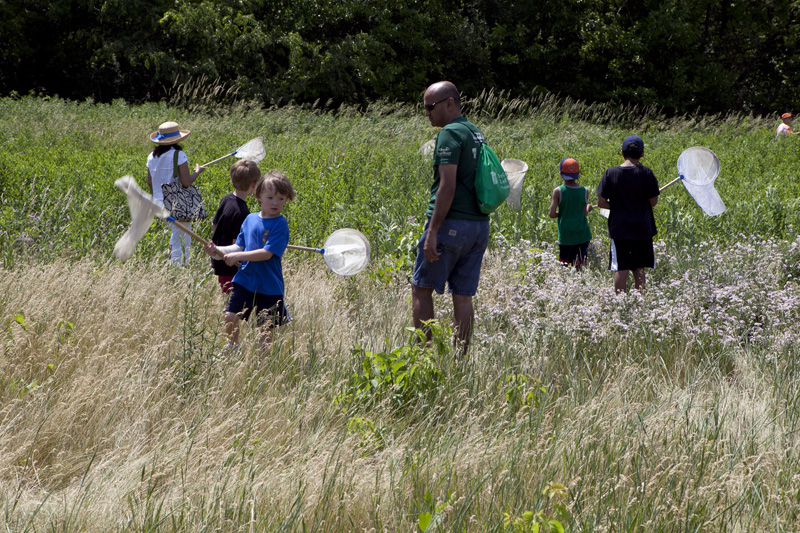Students explore and compare the biodiversity of Illinois’ prairie, woodland, and wetland ecosystems to learn the many ecosystem services they provide. Students collect authentic data using scientific practices and field survey tools to expand their knowledge of interdependent relationships of organisms and the effects of abiotic factors and human impacts on their environment.
Students investigate tallgrass prairie to learn about the legacy of Indigenous people and their Traditional Ecological Knowledge (TEK) that maintained the Illinois prairie for thousands of years through practice of reciprocity and conservation.
As community scientists, students engage in field research that provides meaningful data for the ecological restoration efforts of Fermilab ecologists. They learn the importance of stewardship and what they can do to improve and protect the physical world around them.
Field trip activities
- Tree measurement and benefits: measure and identify trees to determine the ecosystem services they provide humanity and the environment
- Structure of a forest: investigate the role each layer serves
- Abiotic data collection: compare ecosystems using scientific instruments to collect authentic data
- Invertebrate data collection: sweep for insects and classify them
- Aquatic monitoring data: net macroinvertebrates in pond water to determine the health of the pond
- Soil structure: determine the infiltration rate and value of different soils
- Explore heat: measure the heat of objects and evaluate their effect on climate change
- Prairie quadrat: identify prairie plants within a square meter to determine the Floristic Quality Index

Field trip details
- Teachers can bring students to Fermilab for free field trips!
- Field trips must be scheduled at least four weeks in advance.
- Group size: minimum of 10 students within the same grade level, maximum of 80
- If your group exceeds the capacity for a given field trip, you may plan multiple visits to accommodate everyone.
- Program Length: 3.5 hours
- Chaperones: One adult chaperone (instructor or responsible adult) is required for every 10 students. Field trips are not permitted for groups that arrive without the minimum number of required chaperones.
- Teachers, aides, chaperones, and any participants 18 years of age and older MUST have a REAL ID-compliant document, such as a passport or enhanced driver’s license, to enter Fermilab. More information about accepted documents is linked here.
- Groups may arrange to eat lunch at the picnic tables outside of Lederman Science Center during the field trip.
Standards alignment
- LS1: From Molecules to Organisms: Structures and Processes
- LS2: Ecosystems: Interactions, Energy, and Dynamics
- LS2: Interdependent Relationships in Ecosystems
- LS4: Adaptation
- ESS2: Earth’s Systems
- ESS3: Earth and Human Activities
Field trip essentials
To fully prepare your students for a physical science or life science visit, you must participate in either a two-hour training session or a summer teacher workshop. These will give you all the information and resources to implement engaging preparatory activities in the classroom that introduce the essential concepts, content, and logistics of the field trip. Your participation will allow your students to learn more about the research and ecology of Fermilab and to better appreciate their on-site experience.
Click here to learn more about the required field trip essentials and to register for future sessions.
Details
Dates
Scheduled as requestedGrades
6-9 Request a field tripContact Information
Education office registrar at edreg@fnal.gov or 630-840-8258
Additional Details
Don’t miss the corresponding Teacher Workshop.
